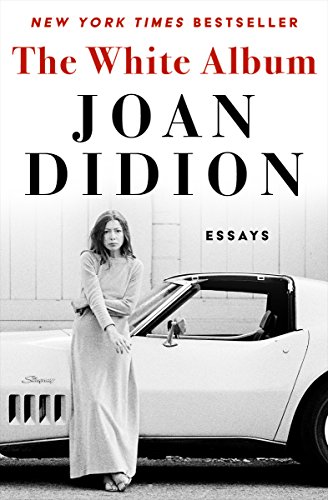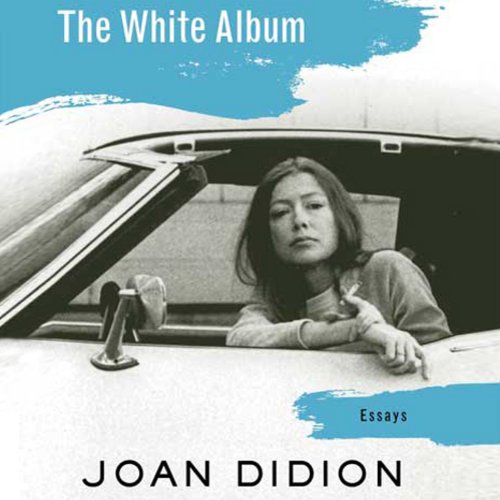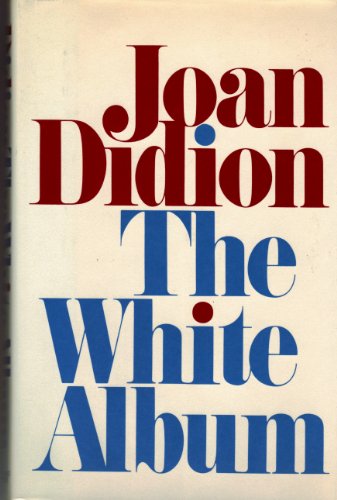-
The White Album: Essays
Joan Didion
eBook (Open Road Media, May 9, 2017)New York Times Bestseller: An “elegant” mosaic of trenchant observations on the late sixties and seventies from the author of Slouching Towards Bethlehem (The New Yorker). In this landmark essay collection, Joan Didion brilliantly interweaves her own “bad dreams” with those of a nation confronting the dark underside of 1960s counterculture. From a jailhouse visit to Black Panther Party cofounder Huey Newton to witnessing First Lady of California Nancy Reagan pretend to pick flowers for the benefit of news cameras, Didion captures the paranoia and absurdity of the era with her signature blend of irony and insight. She takes readers to the “giddily splendid” Getty Museum in Los Angeles, the cool mountains of Bogotá, and the Jordanian Desert, where Bishop James Pike went to walk in Jesus’s footsteps—and died not far from his rented Ford Cortina. She anatomizes the culture of shopping malls—“toy garden cities in which no one lives but everyone consumes”—and exposes the contradictions and compromises of the women’s movement. In the iconic title essay, she documents her uneasy state of mind during the years leading up to and following the Manson murders—a terrifying crime that, in her memory, surprised no one. Written in “a voice like no other in contemporary journalism,” The White Album is a masterpiece of literary reportage and a fearless work of autobiography by the National Book Award–winning author of The Year of Magical Thinking (The New York Times Book Review). Its power to electrify and inform remains undiminished nearly forty years after it was first published.
-
The White Album
Joan Didion, Susan Varon, Audible Studios
Audible Audiobook (Audible Studios, March 21, 2013)First published in 1979, The White Album records indelibly the upheavals and aftermaths of the 1960s. Examining key events, figures, and trends of the era - including Charles Manson, the Black Panthers, and the shopping mall - through the lens of her own spiritual confusion, Joan Didion helped to define mass culture as we now understand it. Written with a commanding sureness of tone and linguistic precision, The White Album is a central example of American reportage and a classic of American autobiography.
-
The White Album: Essays
Joan Didion
Paperback (Farrar, Straus and Giroux, Nov. 10, 2009)First published in 1979, The White Album records indelibly the upheavals and aftermaths of the 1960s. Examining key events, figures, and trends of the era―including Charles Manson, the Black Panthers, and the shopping mall―through the lens of her own spiritual confusion, Joan Didion helped to define mass culture as we now understand it. Written with a commanding sureness of tone and linguistic precision, The White Album is a central text of American reportage and a classic of American autobiography.
-
The White Album
Joan Didion
Hardcover (Simon & Schuster, June 19, 1979)White Album, The by Didion, Joan
-
The White Album
Joan Didion
Mass Market Paperback (Pocket, June 1, 1980)The White Album shakes the sleepy dust from your eyes. It prepares you to go back and look again, look hard, not just at the sixties, not just at California, but at everything in and around you -- The Saturday Review.
-
The White Album
Joan Didion
Paperback (Farrar, Straus and Giroux, Oct. 1, 1990)First published in 1979, The White Album is a mosaic of the late sixties and seventies. It includes, among other bizarre artifacts and personalities, the dark journeys and impulses of the Manson family, a Balck Panther Party press conference, the story of John Paul Getty's museum, the romance of water in an arid landscape, and the swirl and confusion of the sixties. With commanding sureness of mood and language, Joan Didion exposes the realities and dreams of that age of self-discovery whose spiritual center was California.Joan Didion is the author of several novels and works of nonfiction, among them Slouching Towards Bethlehem, The White Album, Miami, Salvador, After Henry, and Political Fictions. She lives in New York City. First published in 1979, The White Album is a journalistic mosaic of American life in the late 1960s and throughout the 1970s. It includes, among other bizarre artifacts and personalities, reportage on the dark journeys and impulses of the Manson family, a visit to a Black Panther Party press conference, the story of John Paul Getty's museum, a meditation on the romance of water in an arid landscape, and reflections on the swirl and confusion that marked this era. With commanding sureness of mood and language, Didion exposes the realities and dreams of an age of self-discovery whose spiritual center was California. "All of the essays manifest not only [Didion's] intelligence but an instinct for details that continue to emit pulsations in the reader's memory and a style that is spare, subtly musical in its phrasing and exact. Add to these her highly vulnerable sense of herself, and the result is a voice like no other in contemporary journalism."Robert Towers, The New York Times Book Review"Didion manges to make the sorry stuff of troubled times (bike movies, for instance, and Bishop James Pike) as interesting and suggestive as the monuments that win her dazzled admiration (Georgia O'Keeffe, the Hoover Dam, the mountains around Bogota) . . . A timely and elegant collection."The New Yorker "Didion is an original journalistic talent who can strike at the heart, or the absurdity, of a matter in our contemporary wasteland with quick, graceful strokes."The San Francisco Chronicle Table of ContentsI. THE WHITE ALBUMThe White AlbumII. CALIFORNIA REPUBLICJames Pike, AmericanHoly WaterMany MansionsThe GettyBureaucratsGood CitizensNotes Toward a DreampolitikIII. WOMENThe Women's MovementDoris LessingGeorgia O'KeeffeIV. SOJOURNSIn the IslandsIn HollywoodIn BedOn the RoadOn the MallIn BogotaAt the DamV. ON THE MORNING AFTER THE SIXTIESOn the Morning After the SixtiesQuiet Days in Malibu
-
White Album, The
Joan Didion, Susan Varon
MP3 CD (Audible Studios on Brilliance Audio, May 10, 2016)First published in 1979, The White Album records indelibly the upheavals and aftermaths of the 1960s. Examining key events, figures, and trends of the era—including Charles Manson, the Black Panthers, and the shopping mall—through the lens of her own spiritual confusion, Joan Didion helped to define mass culture as we now understand it. Written with a commanding sureness of tone and linguistic precision, The White Album is a central example of American reportage and a classic of American autobiography.
-
The White Album
Joan Didion, Susan Varon
Audio CD (Audible Studios on Brilliance Audio, Jan. 25, 2019)First published in 1979, The White Album records indelibly the upheavals and aftermaths of the 1960s. Examining key events, figures, and trends of the era—including Charles Manson, the Black Panthers, and the shopping mall—through the lens of her own spiritual confusion, Joan Didion helped to define mass culture as we now understand it. Written with a commanding sureness of tone and linguistic precision, The White Album is a central example of American reportage and a classic of American autobiography.
-
The White Album by Didion,Joan.
Didion
Paperback (FararStrauss&Giroux, March 15, 1990)Will be shipped from US. Used books may not include companion materials, may have some shelf wear, may contain highlighting/notes, may not include CDs or access codes. 100% money back guarantee.
-
White Album
Joan Didion
Hardcover (Trafalgar Square, March 15, 1979)None
-
The White Album
Joan Didion
Paperback (Penguin, March 15, 1986)None
-
The White Album
Joan Didion
Paperback (Pocket, Aug. 2, 1983)Like Joan Didion's previous book Slouching Towards Bethlehem, The White Album is a collection of works previously published in magazines such as Life and Esquire. The subjects of the essays range widely and represent a mixture of memoir, criticism, and journalism, focusing on the history and politics of California in the late 1960s and early 1970s. The title of the book comes from its first essay, "The White Album," which was chosen as one of the 10 most important essays since 1950 by Publishers Weekly.The opening sentence of this essay-"We tell ourselves stories in order to live"-would become one of Didion's best-known sayings, and was used as the title of a 2006 collection of Didion's nonfiction.